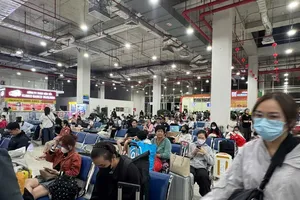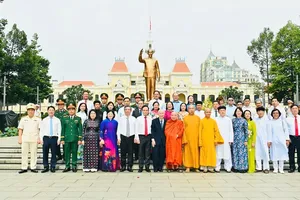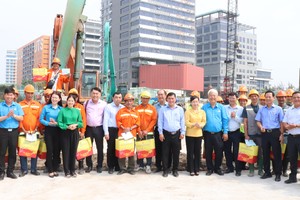
The information was provided at a conference organized by the People's Committee of Ho Chi Minh City on December 26 to review the implementation of tasks for socio-economic development in 2024 and set targets for 2025.

At the conference, Standing Vice Chairman of the People's Committee of Ho Chi Minh City Duong Ngoc Hai informed that Ho Chi Minh City’s economy continued to recover in 2024, with growth higher than in the previous quarter.
The Gross Regional Domestic Product (GRDP) in 2024 is estimated to increase by 7.17 percent compared to 2023, nearly reaching the set target of 7.5 percent - 8 percent. The total retail sales of goods and services are estimated to reach over VND1,206,261 billion (US$47.35 billion), an increase of 10.7 percent. The total export turnover of enterprises in the city through border gates nationwide is estimated to reach US$46 billion, showing a rise of 8.3 percent compared to 2023.
The total import turnover is estimated to reach US$58.6 billion, up 5.9 percent compared to the same period last year. Total tourism revenue achieved VND190,000 billion, an increase of 18.8 percent compared to the same period in 2023, reaching 100 percent of the plan.
According to Standing Vice Chairman of the People's Committee of Ho Chi Minh City, Duong Ngoc Hai, in 2024, Ho Chi Minh City has focused on effectively resolving the difficulties and obstacles of businesses.

There are 3 out of 21 economic and social development targets expected to be unmet. The growth rate of newly established enterprises and registered capital has decreased compared to the same period in 2023. The progress of implementing projects under the Smart City project still has some limitations, especially for large-scale and highly complex projects. In addition, the digital transformation work still faces some obstacles. The implementation of some models of the national digital transformation for the period of 2022-2025, with a vision to 2030 (Project 06) in Ho Chi Minh City, is still slow.
The target of GRDP growth of over 10 percent in 2025
In 2025, the People's Committee of Ho Chi Minh City aims to strive to complete the goals of the 2021-2025 term and to be ready to implement the resolution of the 12th Party Congress of Ho Chi Minh City for the 2026-2030 tenure.
Ho Chi Minh City expects to reach the GRDP growth target of over 10 percent, the service sector to account for over 60 percent of GRDP, and strives for the digital economy to contribute about 25 percent to GRDP. Specifically, GRDP per capita will reach US$8,500 a person by the end of 2025. The total social investment capital would account for an average of about 35 percent of GRDP, while the rate of increase in social labor productivity is expected to reach 7 percent.
Ho Chi Minh City also strives to be among the top 5 localities in the country in terms of the Provincial Competitiveness Index (PCI) and the top 15 localities in the Public Administration Reform Index (PAR-index).

The city has set forth 10 key tasks and solutions for 2025, including building and implementing the city’s theme for 2025, mobilizing all resources and preparing solutions to ensure development investment capital of VND500,000 billion for 2025, rapidly developing high-value-added service sectors, and promoting the development of the digital economy and the green economy.
In addition, the city has also strengthened the planning and investment in synchronous infrastructure, implemented the city's general planning for the period 2021-2030, with a vision to 2050, and general planning for HCMC until 2040, with a vision to 2060, removing obstacles and promoting the development of a safe, healthy, and sustainable real estate market.
In addition, Ho Chi Minh City continues to effectively implement the urban government model, propose the completion of the model and legal framework of the urban government close to development practice, build the city’s effective public service, promote administrative reform in line with the implementation of digital transformation, create a digital government, a digital society, and digital citizens.
























